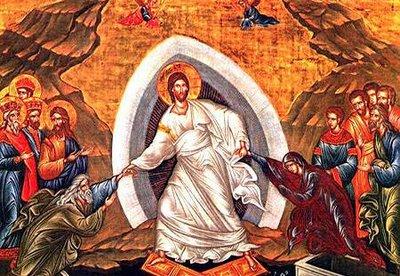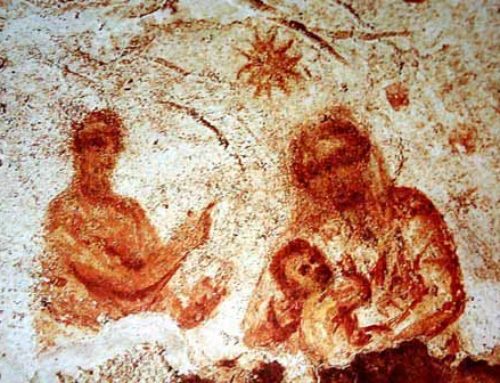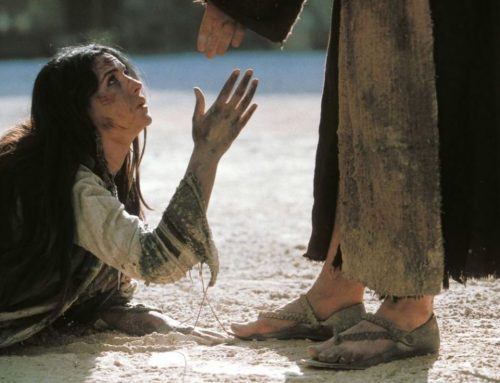“We need constantly to contemplate the mystery of mercy. It is a wellspring of joy, serenity, and peace. Our salvation depends on it. Mercy: the word reveals the very mystery of the Most Holy Trinity. Mercy: the ultimate and supreme act by which God comes to meet us. Mercy: the fundamental law that dwells in the heart of every person who looks sincerely into the eyes of his brothers and sisters on the path of life. Mercy: the bridge that connects God and man, opening our hearts to the hope of being loved forever despite our sinfulness.” -Pope Francis, Bull Misericordiae Vultus, 2
1. What are the works of mercy?
It is my burning desire that, during this Jubilee, the Christian people may reflect on the corporal and spiritual works of mercy. It will be a way to reawaken our conscience, too often grown dull in the face of poverty. And let us enter more deeply into the heart of the Gospel where the poor have a special experience of God’s mercy. Jesus introduces us to these works of mercy in his preaching so that we can know whether or not we are living as his disciples. Let us rediscover these corporal works of mercy: to feed the hungry, give drink to the thirsty, clothe the naked, welcome the stranger, heal the sick, visit the imprisoned, and bury the dead. And let us not forget the spiritual works of mercy: to counsel the doubtful, instruct the ignorant, admonish sinners, comfort the afflicted, forgive offences, bear patiently those who do us ill, and pray for the living and the dead.
Mercy is more than simply being compassionate. Mercy is the overflow of charity, which brings with it also an overflow of justice. Mercy means keeping one’s heart totally alive, throbbing in a way that is both human and divine, with a love that is strong, self-sacrificing and generous. Here is what St Paul has to say about charity in his hymn to this virtue, “Charity is patient, is kind; charity feels no envy; charity is never perverse or proud, never insolent; does not claim its rights, cannot be provoked, does not brood over an injury; takes no pleasure in wrong-doing, but rejoices at the victory of truth; sustains, believes, hopes, endures, to the last” (I Cor 13: 4-7).
You cannot think of others as if they were digits, or rungs on a ladder on which you can rise, or a multitude to be harangued or humiliated, praised or despised, according to circumstances. Be mindful of what others are – and first of all those who are at your side: children of God, with all the dignity that marvellous title entails.
2. What are the works of mercy?
The seven Corporal Works of Mercy are:
1. To feed the hungry.
2. To give drink to the thirsty.
3. To clothe the naked.
4. To welcome the stranger.
5. To visit the sick.
6. To visit the imprisoned.
7. To bury the dead.
The seven Spiritual Works of Mercy are:
1. To admonish sinners.
2. To instruct the ignorant.
3. To counsel the doubtful.
4. To comfort the sorrowful.
5. To bear wrongs patiently.
6. To forgive injustice.
7. To pray for the living and the dead.
Most of the corporal works of mercy are taken from our Lord’s description of the Last Judgement (Matt 25: 34-46), and from Tobias chapters 1 and 2.
The Church has drawn up the list of the spiritual works of mercy from various parts of the Bible, especially Christ’s teachings on forgiveness, fraternal correction, consoling others, bearing suffering, etc.
3. What effect do the works of mercy have on the people who practise them?
The works of mercy gain graces for those who practise them. In St Luke’s gospel, Jesus says: “Ask, and it will be given you” (Lk 11:9). Therefore, by doing works of mercy we are doing God’s will, we are giving to others, and our Lord has promised that he will also give us what we need.
Another consideration is that one way to get rid of the debt of punishment remaining in our souls for sins that have been forgiven, is to do good works. The obvious good works we can do are the works of mercy. One of the Beatitudes is: “Blessed are the merciful, for they shall obtain mercy” (Matt 5:7).
What is more, the works of mercy help us to keep going forward on the path to heaven, because they make us progressively more like Jesus, our model, who taught us what our attitude to others should be. St Matthew gives us these words from Jesus: “Do not lay up for yourselves treasures on earth, where moth and rust consume and where thieves break in and steal, but lay up for yourselves treasures in heaven, where neither moth nor rust consumes and where thieves do not break in and steal. For where your treasure is, there will your heart be also” (Matt 6:19-21). If we act on this lesson from our Lord, we will be exchanging earthly possessions for the riches of eternity, which are the truly priceless treasures.
4. The corporal works of mercy: a brief explanation
St Matthew gives us Jesus’ description of the Last Judgement (Matt 25: 31–46). “When the Son of man comes in his glory, and all the angels with him, then he will sit on his glorious throne. Before him will be gathered all the nations, and he will separate them one from another as a shepherd separates the sheep from the goats, and he will place the sheep at his right hand, but the goats at the left. Then the King will say to those at his right hand, ‘Come, O blessed of my Father, inherit the kingdom prepared for you from the foundation of the world; for I was hungry and you gave me food, I was thirsty and you gave me drink, I was a stranger and you welcomed me, I was naked and you clothed me, I was sick and you visited me, I was in prison and you came to me.’ Then the righteous will answer him, ‘Lord, when did we see thee hungry and feed thee, or thirsty and give thee drink? And when did we see thee a stranger and welcome thee, or naked and clothe thee? And when did we see thee sick or in prison and visit thee?’ And the King will answer them, ‘Truly, I say to you, as you did it to one of the least of these my brethren, you did it to me.’ Then he will say to those at his left hand, ‘Depart from me, you cursed, into the eternal fire prepared for the devil and his angels; for I was hungry and you gave me no food, I was thirsty and you gave me no drink, I was a stranger and you did not welcome me, naked and you did not clothe me, sick and in prison and you did not visit me.’ Then they also will answer, ‘Lord, when did we see thee hungry or thirsty or a stranger or naked or sick or in prison, and did not minister to thee?’ Then he will answer them, ‘Truly, I say to you, as you did it not to one of the least of these, you did it not to me.’ And they will go away into eternal punishment, but the righteous into eternal life.”
1) To feed the hungry, and 2) To give drink to the thirsty.
The first two corporal works of mercy go together, and describe the help we should provide – food and other necessities – to the poorest and most needy, who do not have enough to eat every day.
In St Luke’s gospel, chapter 3, verse 11, our Lord tells us: “He who has two coats, let him share with him who has none; and he who has food, let him do likewise.”
3) To clothe the naked.
This work of mercy provides for another basic need: clothes. It is often made easy for us by collections of clothes organized in a local church or other center. It can be a good thing to think about giving not only what we do not need or can no longer wear, but also clothes that we still like to wear.
In the Letter of St James we are encouraged to be generous: “If a brother or sister is ill-clad and in lack of daily food, and one of you says to them, ‘Go in peace, be warmed and filled,’ without giving them the things needed for the body, what does it profit?” (Jas 2:15-16).
4) To welcome the stranger.
In ancient times, sheltering strangers was a matter of life and death, because journeys were so complicated and risky. That is not always the case today. Even so, we should take opportunities to offer a place in our homes not simply as hospitality to a family member or friend, but to someone in real need.
5) To visit the sick.
This is a very practical way of helping the sick and elderly, both caring for their physical needs and offering them company and friendly conversation for a while.
The best example in Scripture is the parable of the Good Samaritan, who cared for the wounded man and, when he could no longer do so himself, committed him to the care of another, whom he paid out of his own pocket (Lk 10: 30-37).
6. To visit the imprisoned.
This involves visiting prisoners not only to offer them material assistance but spiritual help too, to help them improve their lives, change their ways, learn a skill so that they can earn their living when they finish their prison sentence, and so on. It also means ransoming the innocent and people who have been kidnapped. In ancient times, Christians used to offer payment to set slaves free, or offered themselves in exchange for innocent captives.
7. To bury the dead.
Christ had no burial-place of his own. A friend, Joseph of Arimathea, gave the use of his tomb. And not only that: he was brave enough to go to Pilate and ask for Jesus’ body. Nicodemus also helped to bury him (Jn 19: 38-42).
It might seem unnecessary to specify burying the dead as a work of mercy, because everyone gets buried. But in times of war, for instance, it may be a very demanding and merciful task indeed. Why is it important to give decent burial to the dead? Because the human body, if it was Christian, was the dwelling-place of the Holy Spirit: we are “temples of the Holy Spirit” (I Cor 6:19).
5. The spiritual works of mercy: a brief explanation
1) To admonish sinners.
Fraternal correction is explained by Jesus himself in St Matthew’s gospel. “If your brother sins against you, go and tell him his fault, between you and him alone. If he listens to you, you have gained your brother” (Matt 18:15).
We should correct our neighbour gently and humbly. We will often find it difficult, but if so we can recall what St James says at the end of his Letter: “Whoever brings back a sinner from the error of his way will save his soul from death and will cover a multitude of sins” (Jas 5:20).
2) To instruct the ignorant.
Enlightening people in any field, including that of religion, whether in writing, conversation, or any other of the available media. As the Book of Daniel says, “those who turn many to righteousness [shall shine] like the stars for ever and ever” (Dan 12:3b).
3) To counsel the doubtful.
One of the gifts of the Holy Spirit is the gift of Counsel. Anyone who aims to give good advice to others must first have a clear conscience and be able to listen to God, because what we should give is not our personal opinion but true guidance to those who need it.
4) To comfort the sorrowful.
Being there for our brothers and sisters all the time, but especially in times of difficulty, means acting like Jesus, who was moved to pity by the suffering of others. We see this in St Luke’s gospel, with the incident of the widow’s son at Naim (or Nain). “As he drew near to the gate of the city, behold, a man who had died was being carried out, the only son of his mother, and she was a widow; and a large crowd from the city was with her. And when the Lord saw her, he had compassion on her and said to her, ‘Do not weep.’ And he came and touched the bier, and the bearers stood still. And he said, ‘Young man, I say to you, arise.’ And the dead man sat up, and began to speak. And he gave him to his mother” (Lk 7:12-15).
5) To bear wrongs patiently.
Patience in the face of wrong is a virtue, and a true work of mercy. However, in cases where bearing other people’s defects or wrong-doing in silence causes objective harm to the person doing wrong, or to others, we also need to have the courage and charity to correct the wrong-doer gently and positively.
6) To forgive injustice.
In the Our Father, we say “Forgive us our trespasses as we forgive those who trespass against us”, and our Lord underlines this point clearly: “If you forgive men their trespasses, your heavenly Father also will forgive you; but if you do not forgive men their trespasses, neither will your Father forgive your trespasses” (Matt 6:14-15). Forgiving offences means overcoming our feelings of resentment and desire for revenge, and instead, treating the offender kindly. The best example of forgiveness in the Old Testament is that of Joseph, who forgave his brothers, after they had tried to kill him and then sold him as a slave. “Do not be distressed, or angry with yourselves, because you sold me here; for God sent me before you to preserve life” (Genesis 45:5). And the greatest example of forgiveness in the New Testament is that of Christ on the Cross, teaching us that we must forgive everything, always. “Father, forgive them; for they know not what they do” (Lk 23:34).
7) To pray for the living and the dead.
St Paul recommends us to pray for everyone without distinction, including those who hold posts of government and responsibility, since God “desires all men to be saved and to come to the knowledge of the truth” (I Tim 2:1-4). The Holy Souls in Purgatory depend on our prayers. It is a good work to pray for them to be freed from their sins (cf. 2 Mac 12:46).
Pope Francis asks all Christians and people of good will to pray especially for persecuted Christians. We can stop and think how we are fulfilling his express wishes, so that our brothers and sisters in the faith may be supported and consoled by our prayer.







Leave A Comment
You must be logged in to post a comment.